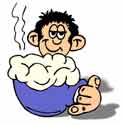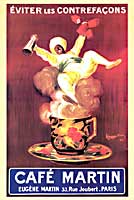|
|
 Espresso: An Art Form with Its Own Following Espresso: An Art Form with Its Own Following
by Marjorie Dorfman
What does the word espresso mean anyway? Do you know or are you content to remain lost in the dark swirl of its wonderful taste? Wake up and smell the espresso and have a laugh or two as well!
|
|
To err is coffee, to espresso divine The Dorfman Archives (sort of)
As a loyal lover of coffee, I am ashamed to admit that I have never experienced what aficionados claim to be its truest form; espresso. The fact that I lived in Italy for several years without even tasting it once is no less than a double whammy-bammy faux pas. The difference between a filtered coffee and an espresso lies in the flow of the highly heated water. With espresso, the water irrigates the grounds as it is forced directly through them, producing an intense coffee flavor. This is the path as opposed to indirectly, half-assed, sideways, round about the bush or limply. The pressure needed to force the water through the coffee grains increases with the fineness of the grind and the degree of compression. The higher the compression used, the more complete the flavor extractions.
Generally, espresso describes any type of coffee that has been brewed by steam. The word refers to the method of preparation and not to any specific brand. But like all relative things in life, some espressos are better than others. Anything really goes however, as espresso attracts experimentation and the adventurous mind. (If it were a mountain to climb instead of a cup of coffee, I can’t even contemplate the ramifications.) Per capita consumption of coffee in Italy is equal to only 75% of French and 57% of German consumption. One can extract from these statistics that each cup is thus more important. In the Italian tradition, a cup rarely exceeds one and one half fluid ounces, about 45 milliliters of fluid.
You can buy this Art print
at AllPosters.com

Café Martin
24 in x 36 in
|
What does espresso mean anyway? Well, there are several thoughts on the subject. The word expresso is generally thought to mean fast or straight through (like an express train). The truth among the grinds is that espresso is anything but a fast cup of coffee. The Italian verb esprimersi means to express oneself, to word. Also, there is the verb espirare, meaning to expire, which after drinking several cups of the strong brew some people probably did. The more accepted connotation is from the adverb espressamente which means expressly for you. It is a word that is applied to food and drinks that are made at the moment of asking. Although it has now changed from an adverb to a noun, an espresso by any other name is still a you-know-what. When one requests espresso in an Italian bar or restaurant it always means a coffee that is prepared for no one but yours truly. You say expresso and I say espresso, but just drink it and don’t worry about calling the whole thing off or offending The Gershwin brothers. (They’ve been dead a long time anyway.) And don’t get a swelled head about the special preparation either. It’s the same for everyone!
Louis Bernard Babaut created the first known espresso machine in 1822. It was commercialized by Edward Loysel de Santais in 1843 and presented to the world at the Paris Exposition in 1855. The machine packed a measured amount of coffee in a designated chamber where a valve allowed steam to press the water through the grinds with a special filter. The cup was fast and the 1855 model was said to have produced one thousand cups an hour. Thus the word express became permanently associated with both the machine and its product.
This early machine had two teeny, tiny drawbacks. It sort of blew up from time to time whenever a steam fitting or chamber failed, taking with it whosoever had mastered (or in this case, failed to master), the secrets of its operation. Another drawback was that the coffee would burn if care was not taken to insure that the steam chamber didn’t get too hot. Whatever can be said about its failings, no one can deny that Mr. Babaut and Mr. Santais were two jolly good fellows and that their creations produced a superior cup of coffee. It extracted only the best from the grind and the high pressure forced the water completely through rather than being satisfied to just merely say hello to the grinds as it passed. This process emulsified the coffee and made it smell better along with giving it a velvety texture.
Making espresso in the old days (not that I remember, you understand), was a real art that required skill, knowledge and interpretation on the part of the operator. The degree of roast, correct grind size and grind packing, the steam pressure and the quantity of water were all important factors in the creation of a perfect cup of espresso. The earlier machines allowed for much variance. Those who wanted to save on coffee beans used less grounds, causing the forced water pressure not to totally penetrate the grinds. Those who wanted a larger cup of coffee allowed more water to go through the system, diluting the brew and extracting unwanted substances.
|
|
|
|
 |
|